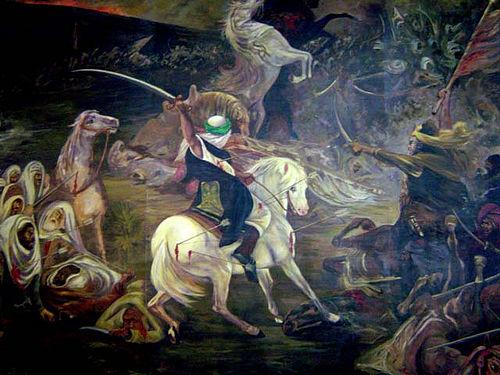
Why did Imam Hussain choose military confrontation over peace when his brother, Imam Hassan brokered it with Mua’wiyah? One immediate answer would be to argue that Yazid was not Mua’wiyah and that his rule was in fact much too tyrannical and divorced from Islam for anyone to permit. Such assessment would be in fact satisfactory.
Imam Hussain’s martyrdom was not a random act of resistance – it was a necessity, and a religious duty. There could have been no other way. The sword was what would cleanse the filth of Yazid’s regime …
It is in the service of Islam that our Imam unsheathed his sword – any other claim stands in defiance of his courage and righteous guidance.
As the Prophet Muhammad said himself: “Hussain is from me and I am from Hussain.” If we accept that the prophet did not gave in to idle chatter, and if we recognise that every action he took was a religious act, then we were commanded to look upon AhlulBayt as we would the prophet. We were commanded to follow and obey the House with the same fervour, love and devotion we offered the Prophet Muhammad.
Imam Hussain did not, as some observers have alleged, choose martyrdom by default. He did not run to his death because he thought his life forfeited. He went for going was his religious duty.
He went as his grand-father and father before him went – in service of God.
Imam Hussain gave all of his love and all of his loyalty, and kept none for himself. He rose on behalf and for Islam until he could rise no more.
His martyrdom ought to be remembered as such. By killing Hussain, it is as if Yazid had killed the prophet Muhammad … how would we remember such a heinous crime?
Would we argue History and attempt to rationalise depravity? Would we even try? I think not.
Our real argument in Muharram is about legitimacy … our argument has always been about legitimacy! Do we consider, or NOT, the progeny of the prophet to be the rightful heir of Islam? I believe the event of Ghadeer forever laid that question to rest … but of course many will feel dissatisfied.
But then again faith belongs to God, and only, He, can soften hearts and open minds to Truth.
Allow me here to deviate a little to convey a story I was told recently.
A man came once to Imam Ali and said: “I will ask you four questions, so give me their answers –
-What is compulsory, and what is most compulsory?
-What is close-by, and what is most close-by?
-What is amazing, and what is most amazing?
-What is difficult, and what is most difficult?
Imam Ali answered: “What is compulsory is Obeying and worshipping Allah, and what is most compulsory is Abandoning sins and disobedience to Allah!
-What is close-by is The Day of Judgement, and what is most close-by is DEATH!
-What is amazing is the Dunya [world], and what is most amazing is the love of the dunya!
-What is difficult is the Grave and what is most difficult is Leaving this world without Provision (for it)!
Oh Allah, the changer of the hearts, please make my heart steadfast upon your religion.
Oh my Lord, whoever opens this message of mine, and reads it, please open for him, the door of your blessings and provision from the heavens and the earth … And whoever spreads it amongst your slaves, do not deny him your paradise.”
…
Taking into account all the developments which took place during the three decades the Muslim ummah spent under the thumb of Mua’wiyahd and then Yazid, Imam Hussain deducted that too many deviations had taken place for sermons and injunctions to suffice.
Should the deviations of the caliphate and the people had been superficial, reforms might have been possible. But moral gangrene had taken hold …
Mua’wiyah and Yazid’s rebellion against God were too great and too deep for Imam Hussain to tolerate, especially when the very political foundations of Islam stood in the balance.
Corruption had permeated through society – injustice had become pandemic and the people no longer the rights which Islam came to assert.
Imam Hussain therefore concluded that an uprising was necessary. Revolution became a fight for liberation and religious restoration.
Just like the Prophet Muhammad stood against polytheist Mecca, Imam Hussain rose a tide against Yazid.
Imam Hussain’s intentions are made clear in the correspondence he held, beginning with the testament he wrote in Medina for his brother Muhammad ibn Hanafiya, and until the last speech he delivered before Hurr ibn Yazid Riyahi and his companions in Bayzah.
When the Governor of Medina pressed the Imam to pledge his allegiance to Yazid, Imam Hussain visited the grave of the Holy Prophet for two consecutive nights and offered prayers there. During the second night he performed a few rakats of prayers and then said: “O Almighty Allah! This is the grave of Your Prophet and I, too, am the son of the daughter of Your Prophet. O Lord! You know with what predicament I am faced”.
In his supplication to Allah the Imam says: “O Lord! You know with what predicament I am faced”. Predicament here refers to corruption which then ate away at the Muslim ummah, not Imam Hussain’s personal difficulties.
Then the Imam said: “O Lord! You know that I like good deeds and hate indecent deeds”. With these words the Imam mentioned his object to some extent, but not so clearly that the common people might understand as to what he meant to say.
Then he said: “O Almighty Lord! I beseech You in the name of this grave and the master of this grave to show me the path by means of which You as well as Your Prophet may be pleased with me”.
source : shafaqna













